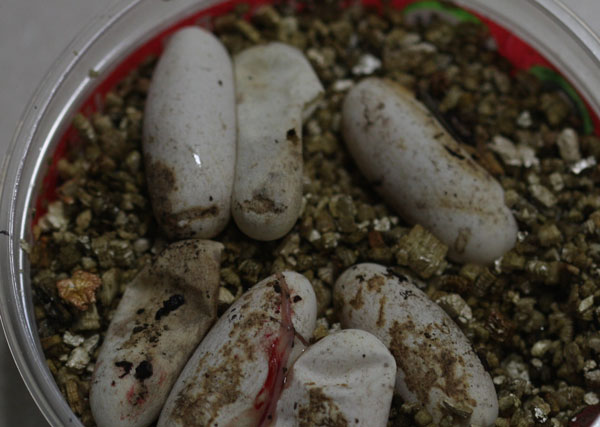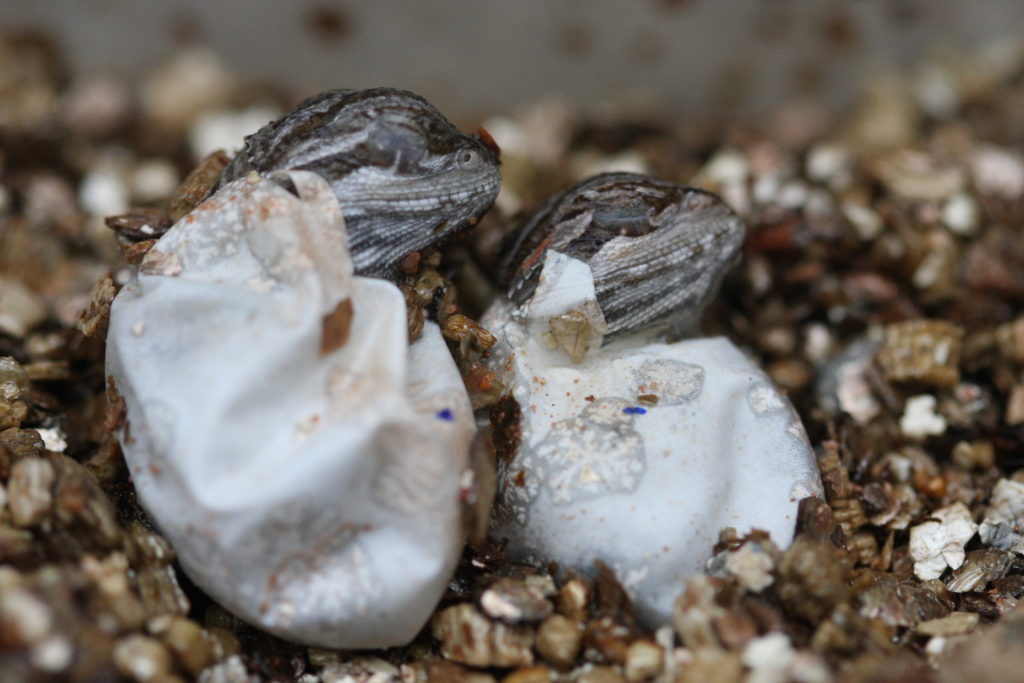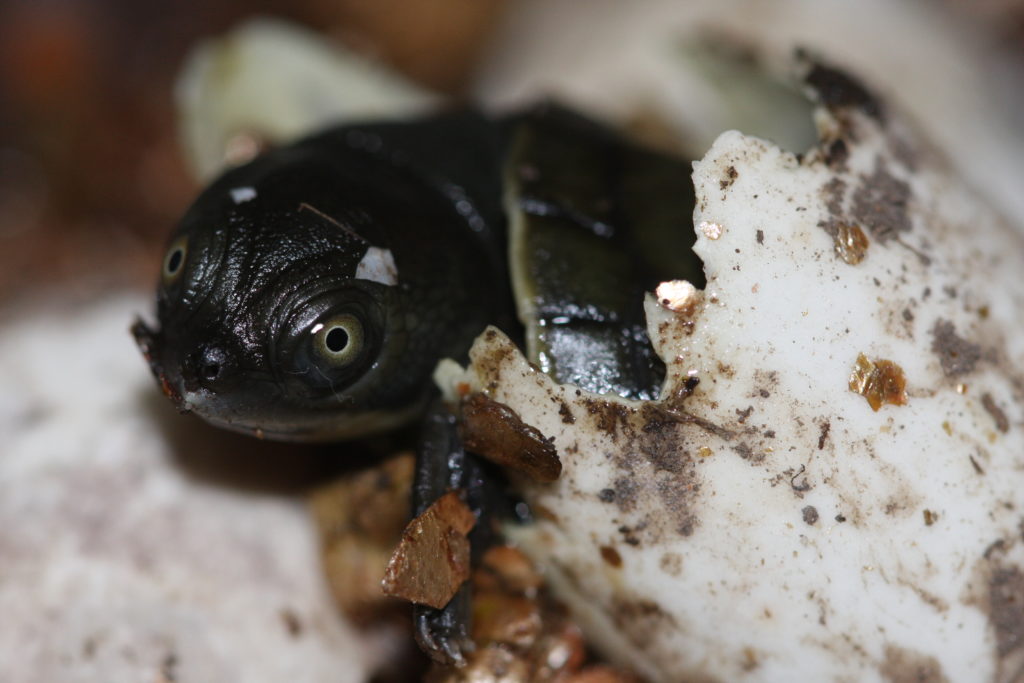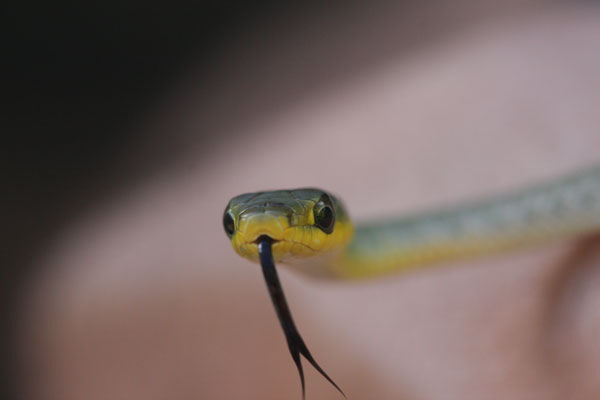I received a call from Deborah Metters, Land for Wildlife Regional Coordinator, in early December 2014 about some likely reptile eggs that she accidentally uncovered whilst digging up large stones on her property. We met at the local Bunnings car park for me to look at the eggs and indeed they were reptilian, most likely from a Common (Green) Tree Snake.
As a wildlife carer specialising in reptiles, I know how important identification is when dealing with snake eggs as some of our most venomous snakes such as Eastern Brown Snakes lay eggs. Other snakes such as Red-bellied Black Snakes are live-bearers. I have a lot of experience with hatching all species of reptiles (I hatch about 100-150 reptiles every year), so I was confident that these were Common Tree Snake eggs.

The seven Common Tree Snake eggs that came into care, three of which could not be saved.

Hatching Bearded Dragons
Once home, I could see that these eggs were in a lot of trouble. They were clumped together (as snake eggs often are) and some were badly damaged. There were seven eggs in the clutch and three were beyond salvaging. I placed the viable eggs in an incubation medium of vermiculite and water and placed them into a reptile incubator.
On Christmas Day, I got the best present ever: one of the three eggs had a head out. They were indeed baby tree snakes. By Boxing Day all four babies had successfully hatched. The babies were rested for a few days in individual containers and then released back into the wild. I must say, I never tire of hatching babies and these were special as not often snake eggs come into care. Mostly, I hatch dragons and turtles, so these were little emerald gems!
In addition to hatching reptiles, this year, I turned my attention to birds. Unlike reptile eggs, bird eggs need to be regularly rotated and their temperature and humidity requirements are vastly different from reptile eggs. So far this year, I have successfully hatched Rainbow Lorikeets, Azure Kingfishers, Masked Lapwings and Bush Stone-curlews. They have all been returned to the wild.

A hatching Brisbane River Turtle

One of the four surviving Common Tree Snakes.
If you dig up eggs, they are likely to be reptilian. Reptile eggs are soft, unlike bird eggs. If you can place them back in the ground where you found them, then do so, but try not to rotate them. If you cannot put them back in the ground, place them in a container in the same orientation that you found them. Even cracked eggs may be able to be saved.
Once in a container, keep the eggs warm, but do not overheat them and do not turn them. Try not to let them dry out if possible, so keep a warm wet tissue or material in the container too. Contact your local wildlife care group or call Wildcare on 5527 2444 as soon as possible. For reptile egg care, I can be contacted directly on 0404 660 547. It is important that reptile eggs are placed in an incubator as soon as possible, so try to get them to a carer ASAP and thanks for helping our wildlife.
Article and photos by Annette Bird Land for Wildlife member Jimboomba, Logan and Reptile Coordinator, Wildcare Australia

We found 8 or 9 eggs in our garden. White, about 2.5cm long, kind of oblong. the half formed embryos appeared to be 3-4 cms long with large black eyes.
any idea what they might be? we live in Robina Gold coast, and have not seen snakes here, but we are concerned they may be snakes, especially after I just googled reptile eggs shapes etc
thanks
Rowan
Hello I’m sang working with kws as ranger I got a chance to monitor and need to know about lizard life style was apple to capture lizart digging allow and laying eggs then closed it now one week old from the day was laying waiting results now.
I uncovered some reptile eggs this morning. My guess is that they are turtle eggs….but also wondering if they could be snake eggs….. how can I identify the eggs?
I tried not to disturb them too much and have covered them over with soil.
Thanks
Mel
Hi Mel. It can be difficult to identify reptile species based on their eggs alone. You could photograph them (alongside a measuring tape) and put them on a reptile identification social media page – someone out there might be able to ID them for you. Thanks for simply covering them up though – hopefully they hatch.
Hello, My daughter just found 11 squishy eggs washed out of the dirt after a huge storm.
They are 4cm long with some light stripes on them.
I assume they are Water dragon eggs but worried they are snake eggs.
We have Pythons, whip snakes and tree snakes around here too.
We hatched some skink eggs two weeks ago and wanted to look after these too but worried they are snake eggs instead.
Most were washed out but there were still 4 in the hole.
I have put a light behind and they are all alive but I cannot see any obvious arms and legs.
We accidentally dug up some skink eggs in the garden. We tried to cover them up again and the mother skink went back to that bed once we had left. Is there anything else we should have done or is there anything else we should do?
Hi Robyn. No you did the best. Just cover them up and hopefully they will hatch.
Hello from Virginia, USA!
I found some skink eggs this morning while tilling my garden (by hand). I saw momma, so I was able to identify them. Unfortunately, by the time I found them all had been rolled, rotated, etc. I carefully moved them to beneath a sage plant, and covered them. Momma was trying to hide by sticking her head in the soil. I carefully moved her to be beside her eggs.
My question is this: is there any hope for their survival? I would love to see a clutch of little skinks emerge!
Thanks for your indulgence!
Respectfully,
Bill Sweeney
Hello,
I just found 2 small eggs that believe to either from an anole lizard or from one of the common geckos seen Florida. I had a stack of 3 empty pots in my back porch and when I remove some of the pots from the stack I discovered in the bottom planter 2 eggs on a small patch of dirt that is in there. The planter is practically empty with no soil but the thin patch they are on and not covered. I didn’t put the other planters back in there to be stacked again because I am afraid of accidentally crushing them. My question is what should I do at this point? Should I relocate them into a different pot that has more soil and carefully burry them or should I leave them as is like I’ve done so far?
Thank you,
Ashley K.
I found 5 red headed agama eggs while digging a hole to plant something. I put them back in the ground but I just read about rotation and how bad it is and I don’t know how they were laying before I dug them up. Will they survive?
Hi Kodie. Good chance is that they will survive if you buried them roughly at the same depth that you found them. Fingers crossed!
I found a baby’s skink lizzard egg and I flipped it and I don’t know which side it was originally on is it still possible for it to hatch? Also am I supposed to put
It in soil?
I found a egg of common house lizard
I picked that up
I don’t remember it’s previous orientation I have kept them in himalya wipes so they can be warm and moisturized
What should i do
I found some wild house gecko eggs and I don’t know how to help them but hoping that you can help by sharing me some of the information because I can’t find any information about them on google.